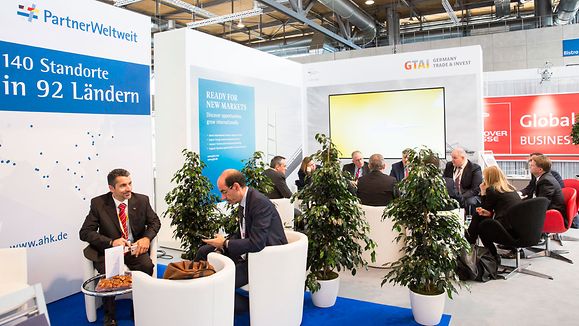digital assets market in Europe in terms of revenue
Your company is already operating in Germany and you would now like to export worldwide?
Key Facts
Blockchain Facts & Figures
Europe’s Largest Private Costumer Market
A penetration rate of 35 percent for digital assets (cryptocurrencies, decentralized finance, non-fungible tokens) is above the European Union and global averages (32 percent and 12 percent respectively). As recently as 2023, this was at 24 percent in the country.Digitalization Potential of German Companies
As of 2024, some 27 percent of companies are already using, planning to use or discussing the use of blockchain technology – this is a six percent increase on the 2023 level.Blockchain Investment Focus
4% of VC funding and 5.5% of deals in Germany go to blockchain startups in 2023 - this represents a disproportionately high level of funding compared to the share of blockchain startups among startups in general. A 3% increase in VC funding in 2023 also demonstrates resilience during times of global investment decline.Regulatory Environment
Regulations such as the Electronic Securities Act or the issuance of licenses for crypto custody services to financial institutions promote the widespread acceptance of digital assets in Germany.Establishing Infrastructure
Many of the fundamental blockchain technologies and network infrastructures were developed in Germany. The country also operates the second largest number of bitcoin nodes in the world – demonstrating Germany’s open and pioneering blockchain technology position.
Opportunities
Growing opportunities in Germany’s Blockchain Industry
Sector-agnostic business potential
Blockchain technology offers a wide range of possible applications – particularly for ensuring transparency, traceability and information security – and has great potential for cross-industry applications. Blockchain is already being used in all sectors in Germany, particularily by large companies. However, the technology also offers considerable advantages for German SMEs who are often engaged in cross-company and international collaboration. Smart contracts enable business processes to be handled more efficiently, reduce transaction costs and increase the international competitiveness of Germany's export-oriented SMEs. According to a Bitkom study, blockchain technology is mostly applied for accounting, finance and controlling activities. Further usage is in logistics, warehousing and shipping. Analyses of current job profiles indicate a wide range of applications for blockchain technology and planned applications particularily in the context of artificial intelligence, automation, the Internet of Things, cybersecurity and Web3 or tokenization of assets. In 2023 most of the German blockchain venture capital was invested in sector-agnostic business models including blockchain networks, data management, verification and analytics, infrastructure, and developer tools. This illustrates the potential of blockchain technology as a key technology for the economy as a whole. In the services sectors, particularly the financial sector shows a strong affinity for blockchain technology – this is reflected by the 25% of German blockchain companies that are active in crypto and finance.
Industry sectors at the forefront
In general, the number of companies in Germany already using or planning to use blockchain rose to 7.2 percent in 2024, while additional 20% of companies are already discussing potential use cases. One in five companies is already considering possible fields of application. Germany’s manufacturing industry is comparatively advanced when it comes to the use of blockchain: the frontrunner is the chemical industry where 14 percent of companies use the technology for their business processes. In the automotive industry, 13 percent of companies use blockchain technology. In the sectors of Advertising and Market Research, Logistics, IT service provision and consulting, blockchain technology is used by at least 10% of companies.
Energy-intensive Industries
Beyond Industrie 4.0 and the financial sector, innovative blockchain applications are also emerging in the energy industry in particular. Some 80 percent of German companies active in energy-intensive industries see blockchain potential for their emissions, energy and sustainability management. Germany’s energy transition, ESG regulations and growing customer expectations of corporate social responsibility will strengthen significant blockchain potential.
Business Environment
The Business Environment for Germany’s Blockchain Industry Enables Growth
Investment Climate
The German blockchain sector proved resilient in 2023, achieving a 3% growth in financing despite global declines. Germany secured 9.4% of European blockchain financing and 10.3% of all blockchain deals in Europe. 72% of investments flowed into early-stage and seed rounds, highlighting the innovative climate. After France and the UK, Germany has the third largest number of startup investors in Europe.
Regulatory Environment
Germany has been actively promoting the blockchain ecosystem and the use of blockchain technologies through its blockchain strategy since 2019. Several government-funded projects – including an energy database and a digital identity system – are in planning. The country has been promoting the adoption of blockchain financial innovations since 2020 through various laws including licenses for crypto custody services (2020), the Electronic Securities Act (2021) and the Future Financing Act (2024). In 2023, the EU created a framework for the uniform treatment of crypto assets (MiCAR) which is fully in effect as of 2025. The introduction of the MiCAR in Germany in 2024 has been accompanied by the national Financial Market Digitization Act and the Crypto Markets Supervision Act in order to increase legal certainty and confidence in tokenized financial innovations and crypto in Germany.
Knowledge Ecosystem
Knowledge is being intensively built up to meet demand for qualified specialists. Universities are increasingly offering blockchain courses (such as the Master's degree course in blockchain and DLT at Mittweida University of Applied Sciences). There are also professional training courses at blockchain competence centers. Facilities such as the Fraunhofer Institute's blockchain laboratory support the transfer of research results to industry. Initiatives such as the Blockchain Expert Dialogue of the Federal Ministry of Economic Affairs, IDUnion and the Future Energy Lab demonstrate the increasing potential of blockchain technology for the German economy. Numerous associations and clusters such as the Blockchain Bundesverband, BerChain, Hanseatic Blockchain Institute, Blockchain.Europe.nrw, and BlockLAB Stuttgart are further strengthening cooperation between companies and scientific institutions.


